Gid hanasheh facts for kids
Gid Hanasheh (pronounced GEE-d ha-na-SHEH) is a special term in Judaism. It refers to the sciatic nerve, which is a large nerve in the leg. According to Halakha (Jewish Law), Jews are not allowed to eat this part of an animal. The name "Gid Hanasheh" means "forgotten sinew" or "displaced tendon." Rules about this prohibition are found in a Jewish text called Tractate Chullin.
Contents
Why Jews Don't Eat the Sciatic Nerve
The Story of Jacob and the Angel
The reason for not eating the Gid Hanasheh comes from a story in the Torah, the Jewish holy book. This story is found in the book of Genesis, chapter 32. It tells about Jacob, an important figure in Jewish history.
One night, Jacob was alone when he met a mysterious figure. This figure was an angel, or a messenger from God. Jacob wrestled with the angel all night long. The angel could not defeat Jacob.
As the sun began to rise, the angel touched Jacob's leg. The touch injured a nerve in Jacob's hip. This injury made Jacob limp for the rest of his life. Even though he was hurt, Jacob refused to let the angel go until he received a blessing.
A Lasting Reminder
After this wrestling match, the Torah says: "Therefore the Israelites do not eat the displaced nerve (gid ha-nasheh) on the hip joint to this very day." This means that the Jewish people remember Jacob's struggle. They do this by not eating the sciatic nerve from animals. It is a way to honor Jacob's strength and his special connection with God.
Removing the Forbidden Parts
What is Nikkur?
The process of removing the Gid Hanasheh and other forbidden fats from an animal is called nikkur. It is a very detailed and careful job. Jewish law requires that these parts are removed before the meat can be eaten.
Selling Hindquarters
Removing all the forbidden parts from the back legs of an animal takes a lot of time and effort. Because of this, it can be quite expensive. In many places outside of Israel, the entire hindquarters (back legs) of an animal are often sold. They are sold to markets that do not follow kosher laws. This helps to avoid the high cost of nikkur. However, in places with many Jewish people, the extra effort might be worth it.
 | Toni Morrison |
 | Barack Obama |
 | Martin Luther King Jr. |
 | Ralph Bunche |


